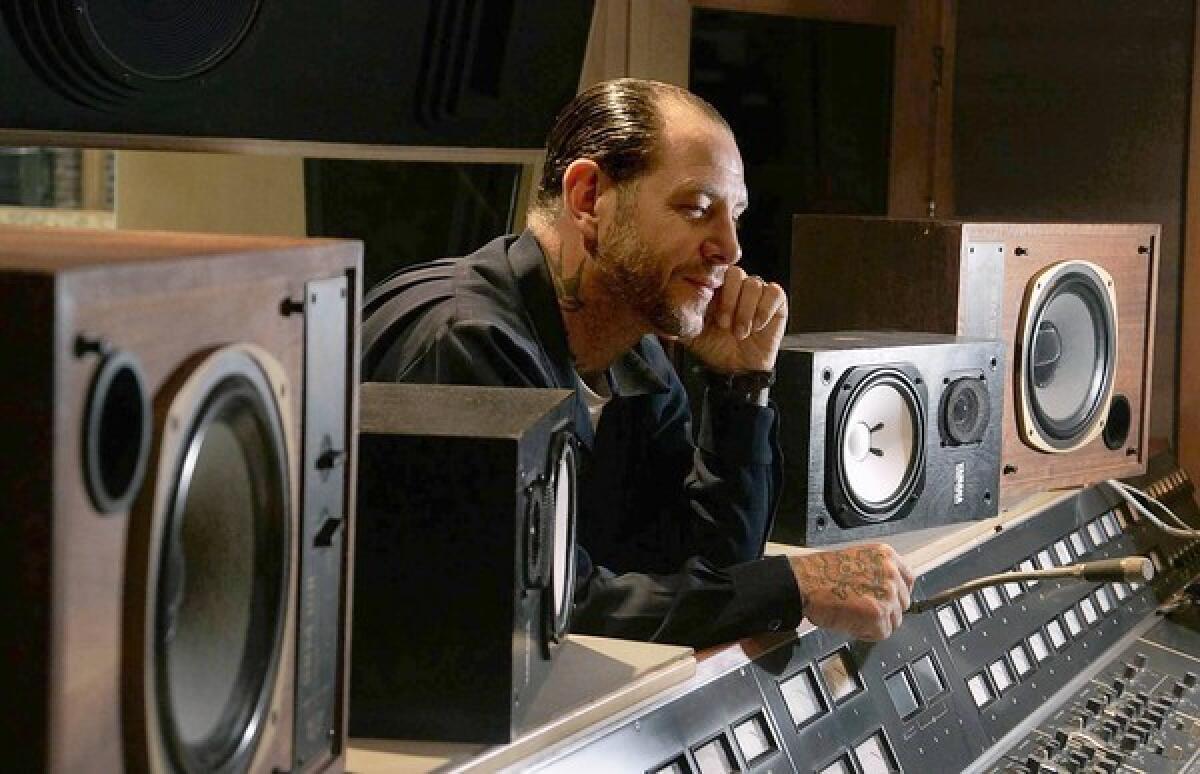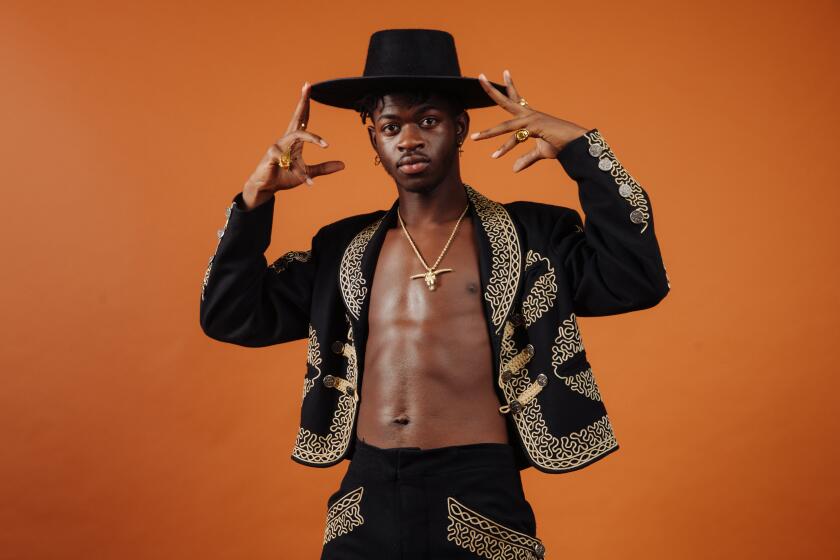Not quite hard times for Social Distortion and Mike Ness

- Share via
During his three decades at the helm of Social Distortion, singer, guitarist and songwriter Mike Ness has repeatedly turned to the rich vein of his own hardscrabble life as a hell-raising teen and then a heroin-addicted rock musician.
But in putting together the band’s new “Hard Times and Nursery Rhymes” album, the Orange County punk band’s first studio collection in six years, Ness seems to have reached the “enough about me” stage in his ongoing efforts to keep his long-running band supplied with fresh subject matter.
So for the first time in the career of one of the small handful of still-active Southland punk rock acts born in the 1970s, Social Distortion has several Ness songs that aren’t predominantly autobiographical. Not that the band’s leader has by any means run out of things to say on that front.
“I can write about Mike Ness and hard times anytime,” Ness, 48, said with a grin during an interview at a Burbank recording studio over the summer while he was at work on the new album, due Jan. 18. “I have plenty of memories and experience to draw from for that. There’s also a lot that’s happened in my life that wasn’t negative or painful and I want to draw from that too.”
For some songs on the “Hard Times” album, he’s drawn on his life not as a punk roaming the streets but as a husband, and a father of two teenagers — not topics he’s customarily addressed. Ness has also crafted several songs revolving around fictional characters and situations in which hard choices are necessary in the pursuit of a life of passion and authenticity.
The first single, “Machine Gun Blues,” sketches a day in the life of a Prohibition era gangster and the live-fast, die-young road he’s throttling down. “Bakersfield” is an uncharacteristically expansive, 6 1/2 -minute loping love lament set in the town that’s both the heart of California country music and the gateway to the agricultural riches of the Central Valley. “Alone and Forsaken,” a minor-key mystery about a vanished lover, gets a supercharged treatment from the band’s signature, distortion-drenched guitars over a powerhouse bass-drum chugging rhythm track.
“The great thing is, I love writing fiction,” he said while seated at the mixing board to play back some rough mixes for a visitor. “For me, it’s literally an untapped source almost. I haven’t done that in so long, but it’s really my favorite genre, in film and writing.”
He went back to one of the band’s first singles,”1945.”
“I daydreamed [in school] for 10 minutes and wrote a song about what it must be like to be in the plane over Hiroshima,” he said. “In a way, this is nonfiction because it did happen. I wasn’t there, but I can put myself in that position, similar to how Johnny Cash must have felt when he was writing ‘Folsom Prison Blues.’”
A conversation with Ness never goes long without touching on Cash, or Hank Williams, or Chuck Berry, or Muddy Waters, roots-music giants who have been a wellspring of inspiration for him since long before he discovered the anything-goes forum that punk rock provided him when he was growing up in the tidy suburban surroundings of Fullerton in northern Orange County.
“The main thing in my mind is I don’t want to do something I’ve already done,” he said. “There is a certain continuity with every record we’ve had that the fans have liked. You have to decipher what’s new and fresh, what’s signature, but you want to evolve, obviously.”
Darkness and light
Social Distortion’s lineup has evolved with the recent additions of bassist Brent Harding and drummer David Hidalgo Jr., the son and namesake of one of Los Lobos’ founding members, now joining Ness and Social D’s guitarist of 10 years Jonny Wickersham.
Another part of the creative evolution involves a philosophical shift that gives the light equal time with the darkness that Ness has historically plumbed in his songs.
“It still has to be cool,” said the man whose densely tattooed torso, slicked-back black hair and rusty chain-saw vocals have represented the epitome of punk cool to a couple of generations of fans now.
He’s also a husband and father of two teenage boys for whom he has strived to avoid repeating the combative relationship he had with his own father. Living in Newport Beach, he’s been actively involved with their school and extracurricular activities, which can present new hurdles when it comes to his music.
“You can’t write about ‘I was coaching my son’s Little League baseball team, chewing sunflower seeds and it was great — we really bonded.’ How do you write that and make it cool? It’s possible,” he said. “You just have to get creative.”
Now that his sons have hit the teen years, Ness the dad is looking at the father-son dynamic from the other side of the fence.
“You think when they’re born, ‘I’m a dad, I’ve grown up now,’” Ness said. “As they get older, you really realize, ‘Wow, I don’t have all the answers….’ It’s forced me to grow up a little too.”
One of the new album’s most touching songs is “Writing on the Wall,” which is universal enough to apply to a separation from any loved one, but which Ness said was written for his 18-year-old son, with whom he grapples over issues that face most fathers of teenage boys.
There was a time when you were proud
You looked up to me with big eyes
And I could do no wrong
But something inside is clearly tearing both of us apart….
Ooh, I can’t let go
It’s a dramatically poignant turnaround for a musician who has so strongly marked his territory as the voice of disaffected youth and who called his group’s debut album “Mommy’s Little Monster.”
“Changing the old anger is the challenge for me,” he said. “When I was 17, it was perfect, because I needed it. I needed it to defend myself against the attacking world, and I had plenty of it. Even in my 20s, it was great. Anger’s great for writing. Like everything, some of these things that were survival skills turn into a double-edged sword in your adult life — they can affect your marriage, affect your relationship with your children, affect your relationships period.
“It’s been a little turbulent,” he said, adding with a twisted smile: “It’s an interesting — and stressful — period in life, and that always does create a good record.”
New beginnings
There’s no producer at his side in the studio this time, because — also for the first time — Ness is producing the new Social Distortion record himself. In fact, 2010 was a year of many firsts for Ness and the band. He parted ways with longtime manager Jim Guerinot, who also manages No Doubt, the Offspring and Nine Inch Nails’ Trent Reznor, and signed up with a longtime associate of Guerinot’s, Shane Trulin, who opened his own management firm.
Social Distortion also signed for the new album with Epitaph Records, the label launched in the early 1980s by Bad Religion’s Brett Gurewitz to put out that group’s records. Over the last three decades, Epitaph has built a sizable stable of punk, alternative, rock and even country acts and continues expanding at a time when much of the rest of the record industry is in retreat.
“I have a feeling it’s the beginning of a very long relationship,” Ness said, citing plans for a Social Distortion acoustic album to mark its 30th anniversary, a band documentary and a third solo album in addition to the group’s always heavy touring schedule.
This week, the group launches a 24-show blitzkrieg through the West over six weeks. The run starts Wednesday at the House of Blues in Anaheim, and includes three nights, Jan. 27-29, at the Hollywood Palladium. The band then heads to Australia for a series of dates.
“It’s just been a year of a lot of changes,” Ness said. “We have the new label, and we really feel the label is behind us…. Ultimately, we’re just a band that would like to sell some records.”
More to Read
The biggest entertainment stories
Get our big stories about Hollywood, film, television, music, arts, culture and more right in your inbox as soon as they publish.
You may occasionally receive promotional content from the Los Angeles Times.










